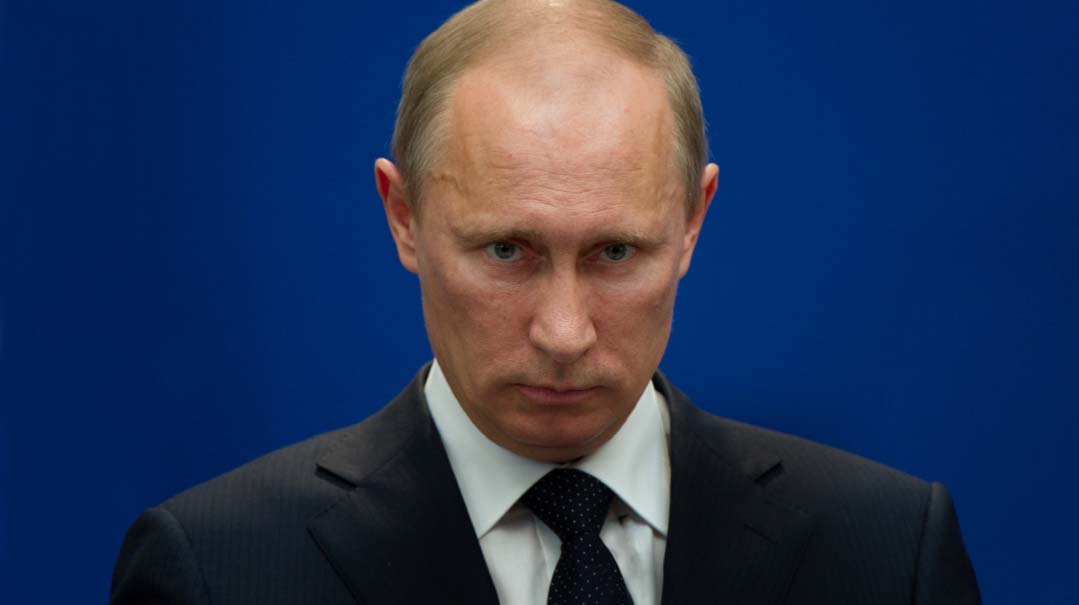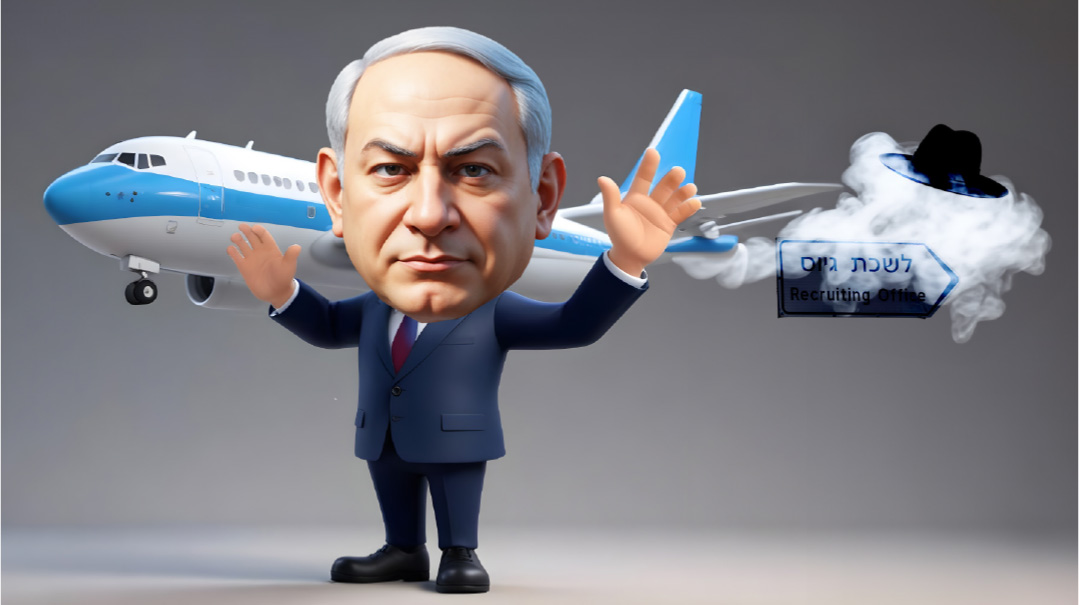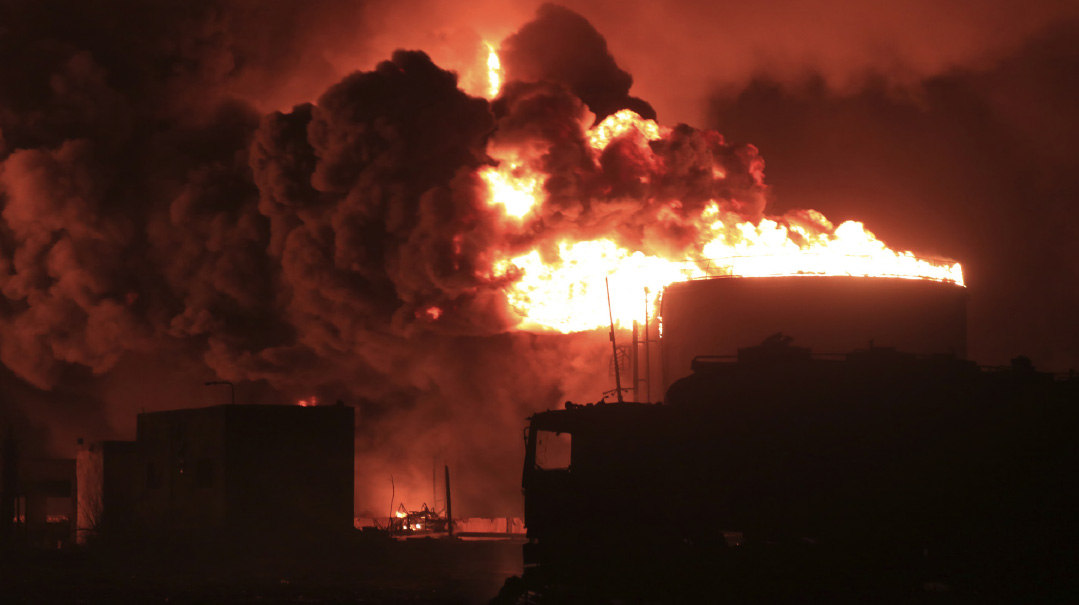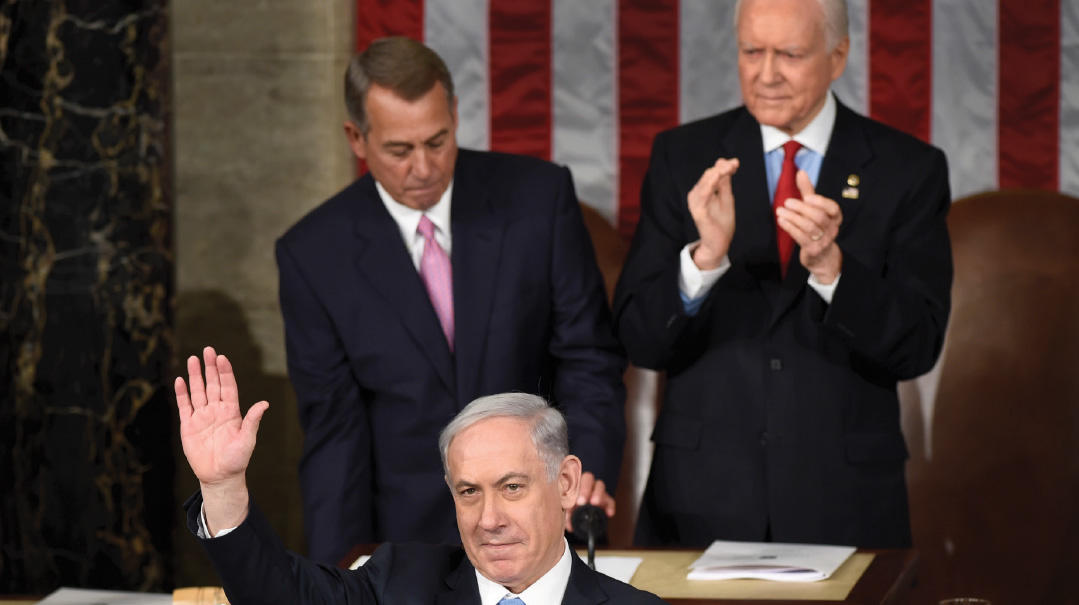Putin’s Revenge

Years of Western appeasement and Putin’s own imperialistic worldview made conflict inevitable

The scene in the Kremlin last Tuesday was something out of the underworld.
As months of tension over Russia’s force buildup around Ukraine peaked, Vladimir Putin sat in a soaring, pillared chamber in the government complex. Cameras rolled, and stone-faced ministers and military men watched from the hall’s periphery, as a sharp-suited figure made his way to a lectern.
The man was Sergey Naryshkin, head of the SVR, Russia’s foreign intelligence service, and he was nervous.
His brief was simple — to rubber-stamp Russia’s recognition of the provinces that had broken away from Ukraine. But the spy chief was ill at ease, stumbling over his words.
“I will support the proposal to recognize…” he said, glancing nervously at the Russian leader for approval.
A smile creased Putin’s plastic surgery-smoothed face, and like someone schooling a child, he broke in and chided, “Will support or do support? Speak plainly, Sergey.”
“I support the decision to incorporate Donetsk and Luhansk into the Russian Federation,” the 67-year-old, long-term Kremlin insider replied with more certainty.
Eyes cast down, fingers lightly tapping the white desk in front of him in a sign of growing impatience, the Russian leader let his spy boss mumble on and then broke in again in amused contempt.
“But we’re not talking about that — we’re talking about whether to recognize their independence,” he said dismissively.
Self-consciously, the intelligence chief corrected himself, earning a curt “Please sit down, thank you” from the Russian president, and the ordeal was over.
Less than 36 hours later, Ukraine’s own ordeal was just beginning as Russia unleashed its armed might. But the choreographed contempt and made-for-TV humiliation of a powerful official contained the essence of what has led Moscow down the path of war.
Two decades after the flaxen-haired former KGB man took the reins of his country, the Russian leader has crushed opposition at home. Along the way, he’s isolated himself. According to many observers, only three men in his government — who don’t include the prime minister or foreign minister — have any influence on his decision making.
While the Mafia-boss imagery explains Vladimir Putin’s penchant for macho diversions, his extreme wealth (estimated by the New York Times at over $100 billion), and his menacing aura, there’s far more to the Russian leader.
Much to the chagrin of Western observers, he’s genuinely popular in Russia as the man who’s restored the country’s fortunes. He’s made Russia safer for Jews than many parts of Western Europe. His quest to restore Russia’s lost power has restored Moscow to a dominant role across the Middle East and Europe.
So as the dogs of war are unleashed on Europe for the first time in decades, the questions that occupy leaders across the West focus on one man. How did the leader of a country with an economy the size of Italy’s become the dominant statesman of 2022, and what will it take to check Putin’s rise?
Disaster Zone
A belief in Russia’s greatness was seared into Vladimir Putin’s soul as a young child. The only surviving child of a father who had been badly wounded defending Leningrad and a mother who had suffered through the siege of that city — their hometown — he was born in 1952 into a city still scarred by the Great Patriotic War.
It was a world of Soviet deprivation. The cramped apartment that they shared with two other families had no hot water, and the communal kitchen consisted of one gas burner opposite a sink.
In a glimpse into the persistence of Jewish life in the heart of Stalinist Russia — and into Putin’s own positive attitude toward Jewish people — one of the families who shared the Putins’ apartment were observant Jews, a couple with a daughter named Hava.
Young Vladimir would hear his neighbor “droning on” in Hebrew, according to an account in The New Tsar, by the New York Times’s Steven Lee Myers. Putin’s interest was piqued. “I could not hold back any longer and asked what he was chanting. He explained about the Talmud, and I immediately lost interest,” he later recalled.
A good student in school, Putin went on to study law while he dreamed of a career as a spy. He was intelligent enough to make the grade for the KGB, but it was only after years as a low-grade officer in Leningrad as the Soviet Union was dying that he was posted overseas. After five years at the Dresden station, he was to preside over the outpost’s demise.
The blow fell on December 5, 1991, when local KGB officers watched as a massive crowd stormed the compound belonging to East Germany’s dreaded secret police, the Stasi.
They knew that the Soviet Union was on its last legs and wouldn’t rescue their Communist allies as it had done in Hungary in 1956 and Czechoslovakia in 1968.
Cabling to Moscow for instructions, the intelligence officer was traumatized by the lack of response: “Moscow is silent,” the radio operator told him.
The officers watched as the crowd turned their attention to the KGB building next door and challenged the guard on duty to let them in.
It was then that a short Russian officer emerged from the building and approached the crowd.
“This house is strictly guarded,” he said in fluent German. “My soldiers have weapons. And I gave them orders: If anyone enters the compound, they are to open fire.”
The mood on the street changed, and as the officer walked back into the KGB building, the crowd dispersed.
Confronting the crowd in Dresden that day was the boldest act of Lieutenant-Colonel Putin’s intelligence career. The episode marked him out for his leadership qualities, and unlikely as it would have seemed at the time, it shaped the future of Europe.
Because, as the colonel-turned-president went on to say in a landmark 2005 speech that was an ominous sign of his thinking, the Soviet Union’s collapse was “the greatest geopolitical disaster of the 20th century.”
The Vladimir Putin who moved back to Russia in 1991 found the country he’d left reduced from a superpower to an impoverished new democracy.
Yet even as he managed the transition to capitalism, Putin’s KGB ways never left him. Rising through the ranks of the St. Petersburg municipality, he joined the Yeltsin administration and was handed the rains of the new intelligence service, the FSB.
As Yeltsin commented about his protégé, “I think his cold expression and the almost military precision of his formulations discourage many people from causing trouble.”
Taking Charge
When Boris Yeltsin’s failing health forced him to step aside, making way for Vladimir Putin’s election in March 2000, the newcomer was almost universally underestimated. One Kremlin watcher dismissed him — presumably because of his slight stature and sallow complexion — as a “mouse running around the Kremlin’s endless corridors.”
President George W. Bush’s infamous remark that he’d looked into Putin’s eyes “and was able to get a sense of his soul” is the stuff of legend.
Both were dreadful mistakes. Within a few short years, Putinism began to take shape as a doctrine of ruthlessness, hunger for power, militarization, and ceaseless attempts to bring back Russia’s lost imperial pomp.
In September 2004, Chechen Muslim separatists took 1,100 civilians hostage in a school in Beslan, in the Russian Caucasus. The Kremlin’s response was merciless: After negotiations went nowhere over two days, security forces attacked.
But this was no pinpoint Western-style SWAT raid; tanks, anti-tank rockets, and lung-collapsing thermobaric weapons were deployed. Predictably, the result was a massacre.
Arriving on scene the next day, the Russian leader blamed the chaos on the Soviet Union’s collapse, and with it, the erosion of central power.
“A horrible tragedy happened in our land,” he said. “Today we are living in conditions caused by the disintegration of a huge, great country.”
Overnight billionaires
The collapse of the Soviet Union’s command economy opened up unimaginable possibilities for those with the wits and ruthlessness to take advantage.
Within a few years, former bureaucrats and security officials had made billions by buying up the state’s assets. They formed a new class: the oligarchs.
With their enormous wealth, they flouted Moscow’s local laws by driving in convoys of sleek black cars, ignoring traffic rules. They also developed a taste for the finer things of life, buying up assets across the West, and creating a boom in the luxury goods market wherever they went.
London quickly became a major destination: its private schools educated the elites’ children, the City of London’s banks laundered the dirty money, and British courts decided their legal battles.
The £1.5 billion invested in the capital’s real estate market in upmarket neighborhoods like Westminster and Kensington spawned the moniker “Londongrad.”
But in 2003, Putin decided to challenge the oligarchs’ power. One, Mikhail Khodorkovsky, the billionaire owner of oil major Yukos, was a political threat, threatening to sponsor rivals for the next Duma elections.
Within weeks, the Yukos boss had been arrested and charged with fraud. His company folded under the weight of the punitive back taxes, and the oligarch himself was sentenced to prison in Siberia.
It was the start of a campaign that ultimately created a class of politically compliant oligarchs.
The bargain with the country’s elites was clear: swear fealty to Putin, keep your nose clean, and immense riches could be yours. Otherwise, a prison cell — or worse fate — could easily be arranged.
Fit for a Czar
Perhaps nothing speaks so loudly of the imperial power that Vladimir Putin possesses as the Black Sea palace that went on public view two years ago, reportedly built for Russia’s leader at a cost of $1 billion.
And nobody has done more to expose the colossal sums spent by the regime’s leaders, at their countrymen’s expenses, than Alexei Navalny.
The towering opposition figure founded the “Russia of the Future” party, essentially an anti-corruption outfit. Instead of lecturing about liberalism, Navalny campaigned to expose the gargantuan embezzlement of state resources that defines Putinism.
“The party of crooks and thieves.” Navalny’s description of the ruling United Russia party, uttered back in 2011, has since entered the Russian lexicon, becoming shorthand for the massive corruption of today’s Russia. In Navalny’s war against the country’s rulers, every exposé of high-level graft was another salvo of heavy artillery, tarnishing Putin’s image as Russia’s strongman father figure.
But after surviving a poisoning attempt at the hands of FSB hitmen in August 2020, Navalny flew back from reconvalescence in Germany into the lion’s den. Unsurprisingly, he was arrested and sentenced to years in a penal colony.
Two days after Navalny’s arrest last year, his organization released another bombshell report, showing a Black Sea palace that they claim was built for Putin at state expense. Against the background of a modern work space, a relaxed-looking Navalny told the camera that the new palace — viewed by camera drone against the azure blue and white cliffs of the seashore — is not an opulent country-house, but “a modern Versailles.”
“It has its own harbor, guards, checkpoint, church, underground ice hockey rink, tunnel to a private beach, and no-fly zone,” Navalny explained. Besides the vastness of the four-sided mansion itself, built around a quadrangle, further evidence of gargantuan wealth is the size of its surrounding estate — nearly three times that of the nearest city.
Kremlin spokesman Dmitry Peskov denied the allegations that there was any connection between the estate and Putin, calling Navalny’s work a “sham investigation.”
The video garnered tens of millions of views — joining a whole cottage industry of “Putin reports” documenting personal wealth alleged to run into many tens of billions.
After Navalny’s arrest, his chief of staff, an Orthodox Jew called Leonid Volkov spoke to me about how corruption had come to prop up the entire system that Putin ruled.
“Corruption is the root cause of what’s going on in Russia, the fundamental problem that’s responsible for all other problems.
“Take, for example, the issue of bad infrastructure: Russia’s roads are not good, the houses are not built well — all that is rooted deeply in corruption. The people at the top steal billions of dollars that should be spent on these things and send them out of Russia for their own personal advancement.
“And the reason we can’t stop this is because the courts are not independent. Corruption again. Or, in another example, the elections are rigged, as happened in 2011 — but you can’t get anywhere by taking it to court. There was open ballot-stuffing, but the courts rejected our appeals.”
Western Weakness
It was the twilight of George W. Bush’s administration, and the 9/11 president’s War on Terror in Afghanistan and Iraq had descended into a Vietnam-like quagmire. The last thing he needed was another major confrontation, but that’s what he got.
In August 2008, Russian tanks rolled into Abkhazia and South Ossetia, two restive Georgian regions whose status had never been clearly settled at the end of the Soviet Union.
It was a short, sharp war — the first European conflict of the 21st century — and Russian power defeated Georgian president Mikheil Saakashvili’s forces.
With more than enough on his plate, Bush sufficed with some rhetoric against Putin’s authoritarianism, and Russia walked away almost undamaged from the conflict.
That taught Vladimir Putin two valuable facts. One was that the decrepit armed forces needed massive investment to fight modern wars.
The second was that America was no longer in the business of European peacekeeping. The powerful beast on Russia’s western flank had been exposed as a paper tiger.
Born aloft on the wings of a sustained oil and gas boom, investment in Russia’s military leapt from $18 billion in 2008 to $55 billion in 2016.
Gone were the rusting naval ships and analogue-era jets and tanks. In came a well-equipped force capable of American-style all-weather precision combat.
It wasn’t long before the next American president, Barack Obama, taught the experienced Russian leader the next lesson in Western weakness.
In 2012, Russian arms were supporting Syrian dictator Bashar al-Assad in his bloody civil war. Obama declared that the use of chemical weapons was a red line that would necessitate American intervention.
Gory evidence duly emerged of Syrian civilians foaming at the mouth after enduring a chemical warfare attack. But instead of enforcing his red line, Obama looked for an off-ramp. Putin obliged with a fig leaf of a deal to destroy Syria’s chemical weapon program.
To Obama’s detractors, it was a demonstration of American weakness that would inevitably whet Putin’s appetite — and the payback came two years later in Eastern Europe.
Fake Country
Willful blindness isn’t unique to Western politicians, but it’s a theme that comes up again and again in democratic leaders’ dealings with autocrats.
Hitler literally wrote a book on his plans for European domination and a Judenrein Germany. Osama bin Laden proclaimed his intention to attack the Great Satan at home.
And for the last 15 years, the Russian leadership’s views on Ukraine have featured in Putin’s speeches and have helpfully been posted on the Kremlin’s English website.
In a 5,000-word essay published last year called “On the Historical Unity of Russia and Ukraine,” Putin indicated that he didn’t believe in Ukraine’s legitimacy as a sovereign state.
“Our kinship has been transmitted from generation to generation, in the blood ties that unite millions of our families. We are one people,” he wrote. Arguing that Russia has been deprived of ancestral land by the post-Soviet division, he declared flatly that “Russia was robbed.”
It was a classic exposition of Putin’s angry revanchism — his determination to reverse the Cold War humiliation and rebuild Russia’s traditional sphere of influence — whether the Ukrainians wanted to be admitted to the greater Russian family or not.
By 2014, Putin was ready to act. Safe in the knowledge that the Obama administration was determined to pivot away from Europe and the Middle East to tackle a rising China, the Russian president deployed newly developed tactics of hybrid warfare.
So-called “little green men” — Russian special forces minus their insignia — invaded the Crimea and Ukraine’s eastern Russian-speaking Donbas region. By the time the ramshackle Ukrainian military reacted, the invasion was a fait accompli.
Once again, focused on China and trade, both America and the European Union imposed some sanctions, and left the field to Putin.
Once again, Putin learned the lesson that the American giant was sagging at the knees.
Power Play
Viewed from the Israeli Air Force’s headquarters in the kiryah in Tel Aviv, Russia’s reentry into power projection looms large.
From 1973 — when Henry Kissinger maneuvered the Russians out of the Middle East by becoming the patrons of both Israel and moderate Arab states — Israel’s jets had roamed unchallenged across the Middle East’s skies.
But suddenly, all changed. In a swirl of desert dust and to the scream of aero engines, Russian power was back in the area as Putin’s military activated an air base in Khmeimim, Syria, and reinforced a longstanding naval presence in Latakia.
Warned by the West that his interference in Syria would become an Afghanistan-style bloodbath, Putin proved the naysayers wrong. His shoestring-budget intervention proved cheap and a testing ground for Russian military technology to boot.
In the years since, short, sharp interventions to prop up friendly regimes have become a staple of Putinism, most recently in Belarus and Kazakhstan.
As a result of Putin’s bold move in Syria, for the first time in four decades, Russian radar ranged freely over Israeli airspace.
Then prime minister Bibi Netanyahu’s cordial relationship with Vladimir Putin resulted in a deconfliction mechanism with the Russians, enabling the air force to strike Syrian and Iranian targets almost at will.
But sporadic reports of “spoofing” — electronic-warfare disruption of Israeli landing systems at Ben Gurion Airport — are a reminder that the bear lurks in the woods of Israel’s northern border.
That menace was uppermost in Israel’s calculations when it vetoed an American sale of the Iron Dome system to Ukraine last year, despite the friendly relations with a country headed by a Jewish president.
Fast-forward to last week, and the result of the West’s chicken-hearted policies have come home to roost.
As Putin’s vast, modernized army rolled into Ukraine in a three-pronged attack, its victim as well as numerous allies from Israel to Europe were exposed by years of Western weakness and Russian strategic advance.
Watching his forces wear down the tenacious Ukrainian resistance, it’s not hard to see Vladimir Putin being toasted by his clique of security officials and pliant oligarchs.
Thirty years after the traumatic collapse of Soviet power, when he stood powerless as civilians rampaged around the hallowed halls of the Stasi’s headquarters, and his sense of world order disintegrated, Vladimir Putin’s attempt to set the clock back looks like the wave of the future. His revenge on Russia’s historic foes is going well.
“Moscow isn’t silent,” Putin might well quote to his officials, as they toast a world where Russia is once again feared.
(Originally featured in Mishpacha, Issue 901)
Oops! We could not locate your form.






